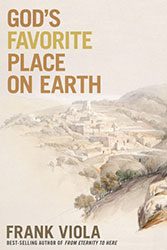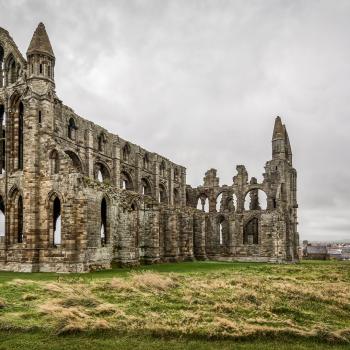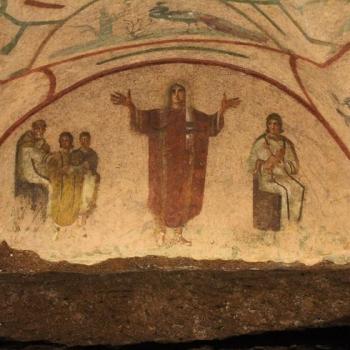“Living after you have died is strange.”
So Lazarus tells us. An understatement, don’t you think? Living before you have died is sometimes very strange, so after you’ve died has to be far weirder. Not many people get to tell that story. In God’s Favorite Place on Earth, though, Lazarus (via Frank Viola) does. (No matter how many near-death experiences you’ve read about, they can’t compete with Lazarus’ four-day adventure.)
Lazarus’ death is one of many vignettes that Viola pulls out of the Gospel stories about Mary, Martha, and Lazarus in Bethany. Martha’s complaining, Mary’s listening; Mary’s messages, Lazarus’ illness; Martha’s declaration of faith, Jesus’ weeping; Mary’s recklessness, Jesus’ commendation. The heavy aroma of stewing lentils and garlic, the sweaty smell of many men, the exotic fragrance of nard; the sound of sweeping and weeping, sobbing and scolding; the image of Jesus stooping to come in the front door and relax with his friends after a long day cursing fig trees and whipping up a frenzy in the Temple; Jesus teaching, blessing, reminding, ascending. All these narratives are short stories told by Lazarus, interspersed with the author’s reflections.
Easy reading, yet thought provoking, Viola’s Bethany song is a prolonged and creative meditation on those earthy stories about Jesus’ friendship with a middle-class family in a small suburb of Jerusalem. The simple rhythm of storytelling and gentle application lead us into Jesus’ humanity while inviting us into his divinity.
Martin Luther likened humanity to a drunk man on a horse, slipping over to one side and being propped up only to slump over on the other. In some ways, Christian theology is not unlike this; we slip slide our spiritual way, sometimes relishing the historical Jesus (which usually means a natural man, first-century rabbi, son of a carpenter, and victim of the Roman Empire), and sometimes losing ourselves in the mystical, magical Lord in whom all things hold together. To hold the two in tension is always difficult, but that is the heart of the Christian mystery: revealed in the flesh, vindicated in spirit, seen by angels, proclaimed among Gentiles, believed in throughout the world, taken up in glory (1 Tim. 3.16).
I especially liked his inclusion of the Ascension as part of Lazarus’ story. All too often we Evangelicals fail to recognize that the Ascension is the completion of the Passion: the Trial-Crucifixion-Death-Burial-Resurrection Event. We jump around in joy at the Resurrection—as we should, of course—yet we often leave the story hanging. And then we quickly move on to the Pentecost (or not … sometimes that’s a little scary too, all that wild speaking in tongues … best to just remember that the Holy Spirit is somewhere nearby). But the Ascension is that culmination of the Passion, the very real—dare we even say, tangible?—glorification of Christ that takes humanity into the very throne room of God. The Ascension is our future.
God’s Favorite Place on Earth is a gentle and friendly book, never challenging in a scholarly sense, but inviting that reader who has seen one too many glittery Jesuses with halos to understand that a) this Man was someone who needed friends, who appreciated good meals, who got tired after a long day at work, and who would probably have loved potato chips, and that b) this Lord was One who can craft holiness and resurrection out of the common elements of my daily rhythms and greatest calamities.
I’m sure I’m not as good of a cook as Martha, nor as bold as Mary, nor quite as dead as Lazarus but I can hope that he would have liked my house, my cooking, and my family’s conversation, that he might think of Emerson Street as one of his favorite places on earth.
Book Club special offer for Patheos readers: Buy God’s Favorite Place on Earth between May 1-7, 2013, and receive 25 free books and audios from 15 different authors, such Leonard Sweet, Adrian Warnock, and Pete Briscoe.
For more on God’s Favorite Place on Earth, visit the Patheos Book Club here.













